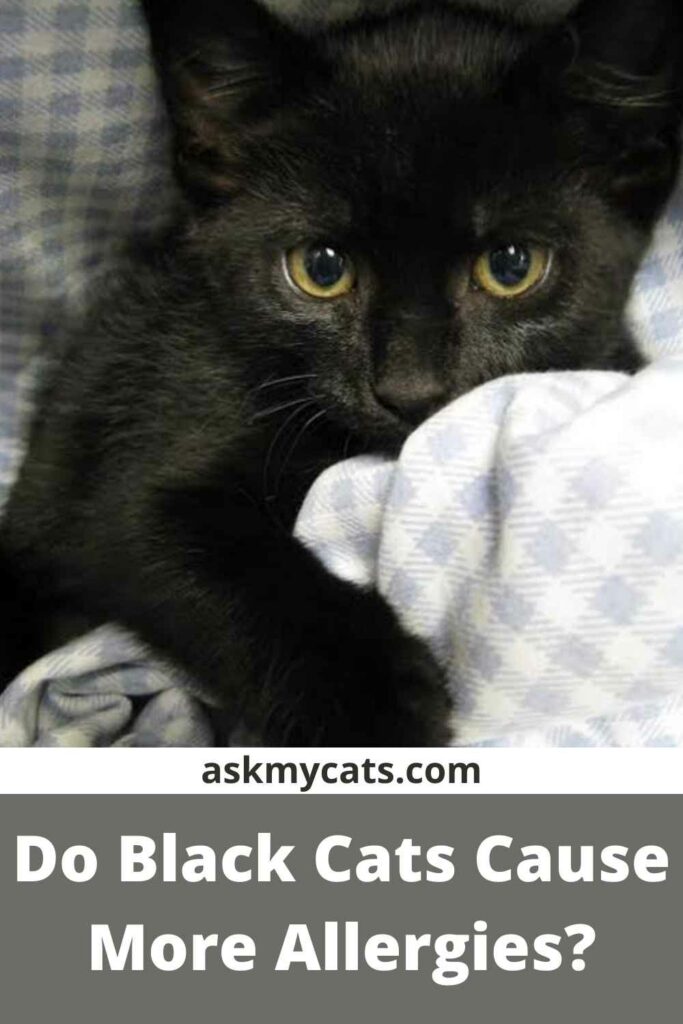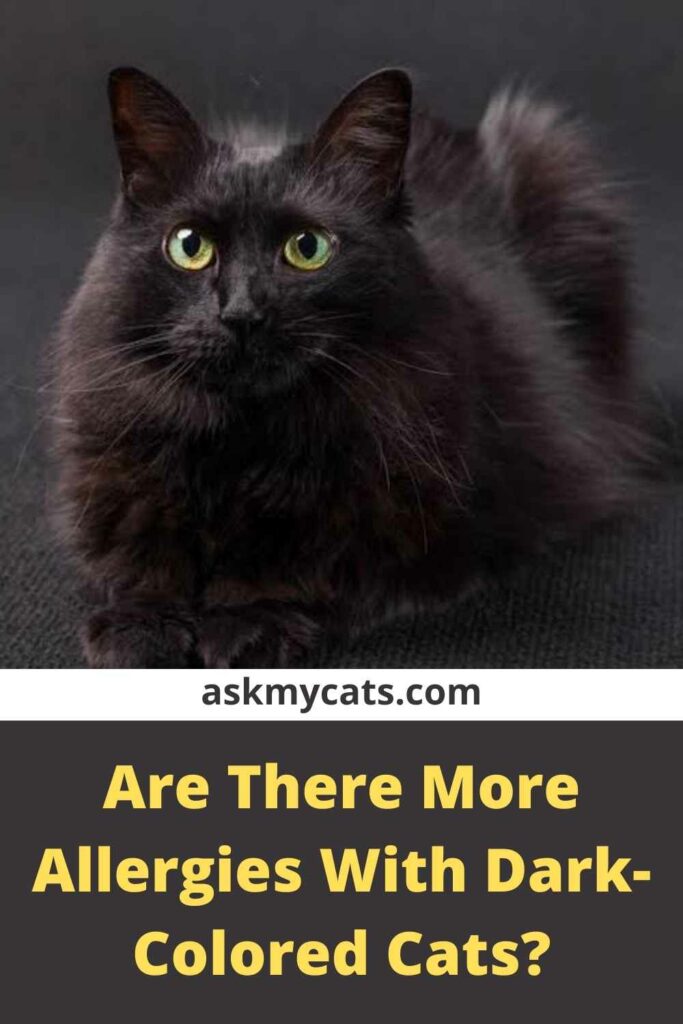As their eyes contrast with their hair, black cats have a stunning appearance. If you want to pet an amazing black cat, you may select from a range of breeds. If you’re prone to allergic responses, though, proceed with caution.
No, black cats are not hypoallergenic. In fact, there is no proof that any cats are hypoallergenic. The allergen responsible for cat allergies, the Fel d 1 protein, is produced by all cats.
According to research published in The Journal of Allergy and Clinical Immunology, the color of a cat’s coat has no bearing on how many allergens it can generate.
Some individuals with allergies can live with cats, and the majority of people only have mild to moderate symptoms. Researchers are still baffled as to why some people acquire cat allergies and others do not.
If you’re allergic to cats, you’ll probably continue to experience symptoms even if the cat isn’t around. Cat allergies can remain on furniture and carpets, textiles, and unwashed clothes, causing this.
If you want to learn more about allergies and black cats, keep reading!


Give Your Cat the Perfect Day
Get the Free Ebook!
What Are The Symptoms Of Cat Allergy?
The following are some of the most frequent cat allergy symptoms:
- Coughing
- Sneezing
- Eyes that are red and inflamed
- Itchy skin
- Asthma attacks
- Rashes on the skin in locations where allergens were present
Doctors use specific tests to establish whether or not you are allergic to cats. Allergy-specific testing, such as blood tests or skin prick tests, are among them.
A little quantity of cat allergen is put beneath the skin during a skin prick test to look for a response. Blood tests are performed to look for immunological components linked to cat allergy.
Anaphylaxis is a severe allergic reaction characterized by difficulty in breathing and low blood pressure. It’s a life-threatening situation, and if you have that, you should go to the doctor right away.
You would also like to read what does it mean when black cat crossing your path while driving
How To Manage Cat Allergy?
Here are some strategies for dealing with cat allergies:
- Leave the windows open to let fresh air into your home.
- Vacuum your house at least once every few days to keep allergies at bay.
- Use cat wipes or a damp towel to bathe your cat every four weeks at the absolute least.
- Maintain the wellness of your cat.
- Have your cat brushed on a regular basis?
- Play carefully so you don’t get licked, scratched, or rubbed by your cat.
- After handling your cat, wash your hands.
- Install a HEPA or high-efficiency particulate air purifier in your house.
Interesting Read: Are Black Cats Smarter Than Other Cats?
Do Black Cats Cause More Allergies?

Cats, whether you like them or not, are one of the most prevalent sources of allergies, affecting many people in the United States.
Allergies are caused by proteins present in feline dander, urine, and saliva, which means that any cat might cause responses.
However, other experts believe that the darker a cat’s coat is, the more likely it is to cause allergic responses.
In a short research involving 300 allergy sufferers conducted in 2000, scientists demonstrated this. They discovered that persons who had dark-colored cats were two to four times more likely to have moderate to severe symptoms than those who had lighter-colored cats or didn’t have a cat at all.
Female cats generate fewer animal allergies than male cats, according to other studies.
However, according to one of the study’s authors, the color relationship isn’t definitive. The color of a cat’s coat had no influence on how many allergens it generated, according to later research published.
askmycats Recommendation
Black cats are the most loving friends you can have in your life. Provide them comfort and entertainment.
Check out this Fun Playhouse you can gift to your Black Cat.
Patients who are allergic to cats but wish to retain them should take numerous precautions. If avoiding contact is not feasible, allergy injections and medicines can help.
We also suggest that you use HEPA air filters, keep your pet out of the bedroom, and bathe it frequently.
This implies that there is no definitive answer to the question of whether black cats cause more allergies.
If you have allergies and want to own a cat, you should probably invest in buying a cat that is hypoallergenic.
You would love to check are black cats friendly
Are Black Cats Safer For People With Cat Allergies?
We believe it is safe to state that no cat is allergen-free, but it is reassuring to know that there are breeds that do not trigger allergic responses in people.
Unfortunately, it appears that more unusual breeds have less allergic responses, whereas typical black cats are troublesome for allergy patients.
According to studies, cats with dark coats cause greater sneezing, congestion, and itchy eyes and throats than cats with lighter coats. This is because dark-colored cats’ fur may contain larger levels of antigens, the proteins that trigger allergic responses.
You must be intrested to know about black cat spiritual meaning
Are There More Allergies With Dark-Colored Cats?

Although it has not been proved, dark-colored cats generally trigger more allergies compared to light-colored cats.
It’s unclear why black cats have such an effect. It might be linked to the thickness or nature of the hairs, according to one idea.
Animal dander, which includes hair, skin scales, fur, and feathers, is known to trigger allergic responses and asthma episodes, with cats having a larger risk than dogs.
According to a new study, dark-furred cats are more likely than lighter-furred cats to induce allergic responses in their owners.
321 patients were polled by doctors at Long Island College Hospital (LICH) in New York, about how many cats they had, how long they’d had them, and what color they were. The intensity of each person’s allergic response was also assessed by the researchers.
Patients who had dark-colored felines were four times more likely to experience allergy symptoms than those who had light-colored cats, according to the study.
Interesting Read: Can Siamese Cats Be Black?
The greatest approach to avoiding allergies and asthma is to live in a cat-free, dust-free, smoke-free environment.
Allergy patients who already have cats in their homes are unlikely to give them permanent vacations since people grow so connected to their pets.
As a result, Millard suggests that you maintain the house and your pet as clean as possible. This involves often washing bed sheets in hot water to remove fur, dander, and saliva, as well as allergy-causing dust mites.
You might be intrested to know what does it mean when a black cat comes to your house
What Is The Best Cat Breed For Those Who Have Allergies?

There are certain cats that produce reduced sneezing, itching, and sniffling in allergy and asthma sufferers.
Certain cat breeds, however, are not hypoallergenic. This definition, according to studies, is just false.
What’s more accurate is that everyone’s allergy threshold is different. One individual with allergies may be unaffected by one variety of cats, while another, if sensitive enough, may respond to the same ‘hypoallergenic’ breed.
Female cats tend to generate less Fel d 1 than male cats, and neutered males produce less than intact males.
Because everyone interacts differently with different cat breeds, experts advocate fostering or interacting with a variety of them to observe how you react.
Interesting Read: Are Black Cats Bad Luck?
Here are a few of the most popular breeds to begin with if you are allergic to cats:
1. Balinese
Even if she’s a bit puffy, this clever, lively darling generates a little less Fel d 1 and has a single-layer coat. She is a perfect choice for those with moderate cat allergies. She will probably be pretty chatty because she’s a Siamese.
2. Javanese
The Javanese, a relative of the Balinese, lacks an undercoat, which means she has less fur to groom and spends more time snuggling. She’s intelligent, good with kids, and simple to train!
Interesting Read: Do Black Cats Shed?
3. Russian Blue
Another stunningly beautiful cat with a lower Fel d 1 level than other breeds. A Russian blue has a rich, luxuriant coat. She doesn’t shed much, so there’s less dander in the air. She’s also a lovable feline, who debunks the stereotype of aloof felines.
4. Siberia
Despite the fact that his beautiful long coat requires weekly brushing and sheds a little more than other cats, you won’t have to worry about sneezing or itching. Siberian cats are enticing for a variety of reasons, including their playful sweetness and low allergen output.
Interesting Read: Why Do All Black Cats Look The Same?
5. Bengal
A Bengal appears like a little wildcat with his unique short, spotted fur. He doesn’t shed as much as other breeds, which is a good thing considering how playful he is and how much attention he needs from his human friends.
6. Cornish Rex
This friendly, athletic cat is up for a game of fetch at any time and place. The fur of a Cornish Rex is wavy and downy soft, with no coarse layer. Baths are required on occasion to remove oil accumulation, but they will also assist to decrease Fel d 1 allergens.
7. Devon Rex
The lively Devon rex has three coat layers, yet her fur is short and wavy with tiny flyaway hair, making her as cute as a pixie and just as naughty. She’s inquisitive, perceptive, and always ready to cuddle.
8. Oriental Shorthair
This beautiful kitty purrs a lot because she loves her folks and wants to be with them all the time. The coat of an Oriental is soft and smooth to the touch, yet she doesn’t shed much if you brush him often, which she will appreciate.
9. Sphynx
The charming, energetic, and quirky breed is perhaps the closest thing to a hypoallergenic breed. Sphynx is a hairless charmer that is extremely loving. His suede-like coat, on the other hand, requires your assistance in controlling skin oil with frequent towel rubs and periodic baths.
You might also intrested to know what does it mean when a black cat stares at you
How Can I Keep My Cat Allergy To A Minimum?
There are a number of ways to keep your allergy to a minimum if you own a cat. Diet and grooming are two effective ways to reduce allergic responses.
Using fish oil or omega-3 fatty acids to keep a cat’s coat healthy decreases the quantity of allergenic protein on the cat’s body.
Bathing reduces protein levels as well, but washing cats has its own set of problems. Dander can be removed with a fine-tooth comb, and hair can be brushed regularly, but this aerosolizes the proteins, so it’s best done outside or by someone who isn’t allergic to cats.
If you’re still in pain, go to the drugstore. While scientists work on hypoallergenic treatments for cats, such as specific feline medication and food that decrease protein triggers, treating humans is easy.
Antihistamines, hyposensitization therapies, and other treatments are available to assist individuals to live more peacefully with cats.
You might also like to more about black cat with pink nose
Frequently Asked Questions
Do Black Cats Trigger Allergy?
There is conflicting research on this subject. Some studies have indicated that darker-furred cats are more allergic than lighter-furred cats, whereas others have found no connection between fur color and allergen levels.
Are Any Black Cats Hypoallergenic?
The Black Oriental Shorthair cat is hypoallergenic. The coat of this breed is short and delicate, and it sheds very little. Brushing on a regular basis will assist remove any loose hairs, decreasing shed hair even more.
Can Someone With Cat Allergies Live With A Cat?
While those with severe, possibly fatal allergies should avoid adopting a cat most people with mild to moderate allergies may live with them.
Interesting Read: What Does It Mean When You See A Black Cat?
Final Words
Black cats have a distinct and stunning appearance that sets them apart. There are at least twenty-two different cat breeds with black coats.
With the surge in individuals asking what cats to get if they have allergies, scientists have discovered that there are hypoallergenic cat breeds.
These cats generate less of the Fel d1 protein, which triggers allergic responses in their owners. You should think twice about having them because it is bad for your health.
Interesting Read: Why Is My Black Cat Turning Brown?
Cats, on the other hand, are not hypoallergenic since no cat is really hypoallergenic, and all cats generate Fel d 1 protein, the allergen that causes cat allergy.
Cats are beautiful and incredible pets. However, if you have allergies, it is difficult to do so because it may result in serious health issues.
Before getting a cat, think about the elements that could impact your allergic reactions, such as the breed and the amount of exposure you’ll get from having one. If you believe you’re ready, go for it and enjoy caring for your kitties.
Drop down your doubts and questions regarding felines in the comment section below!
Must Check Out: National Black Cat Day: When And How To Celebrate?
Interesting Read: Are Black Cats More Aggressive?
Interesting Read: Are Black Cats Really Rare?
You would also like to read about Eye Color Of Black Cats
